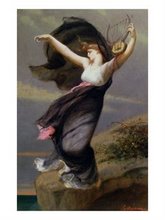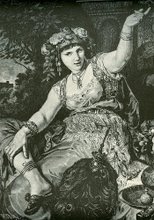Most of the people I know like one or the other better. The Iliad because it's violent, war-like. The Odyssey because there are monsters and Odysseus is cool ("a James Bond type", Avi admits, "You know, even if you're a feminist, you still think James Bond is cool...") and at least it doesn't dwell like the Iliad on the names and histories and gory ends of each fallen soldier. I just hate both. Chiefly because it convinces me that the world is a broken place with skewed priorities, where the worthy are punished and the malicious rewarded. I can take that if it's tongue-in-cheek, if it encourages you to keep fighting for some sense of good even if it will be crushed, a la Catch 22. But not when it expects you to side with the undeserving malicious folks, the "winners of history".
I also hate the term "winners of history". It gives time and fate far too much power.
The Greeks are the winners of history in the Iliad and the Odyssey. Unfortunately they're also a throng of awful, awful people. They take prisoners, the women as sex slaves of course, and get into the most retarded cockfights over who gets which slave (I think the movie Troy tried to create some kind of affection between Achilles and Briseis, am I correct? Give me a break.). Achilles is of course a self-obsessed asshole with a brain the size of a pea. Agamemnon is pompous for no reason, especially seeing as how his wife is plotting to kill him back home, while Menelaus is a hugely incompetent leader and husband, seeing as how he's the one that failed to keep his wife from running away with a total stranger. Odysseus actually doesn't invite too much wrath in the Iliad. I credit him for acting insane to try to get out of Menelaus' draft. But he gets worse later... fear not.
It's not that the Trojans are amazing models of ethical society either - at least Paris isn't. But we all know that Paris is the foremost annoying little prick in the whole saga, sort of like Enoch in Things Fall Apart. But really, as a whole, they haven't done much wrong except raise a fool of a son and allow him back inside their walls.
And I'm weirdly obsessed with Hector and Andromache. I don't think the Greek legends or storytellers have ever crafted a better couple. I sometimes with I had thought up the name "Andromache the Brave" when I still had the opportunity to mess around with my screen name, though I suppose that srikandi116 is more fitting of my heritage. Still, Hector and Andromache's goodbye scene is the tearjerker of the book. This scene has been reproduced a thousand times in my own writing, and in other fictional couples whose exploits I follow. They form the model of the Martyr and His Wife that I have stubbornly adhered to for years now. Hector is after all the man who shows the most devotion and affection toward his wife in the whole of Greek mythos. And Andromache's begging him not to go, and the son being afraid of seeing his father in his battle gear. It all fits. And of course, Hector has to die. You know it as soon as you read that scene.
 And he does die, in the worst way imaginable. I cannot believe Achilles made it to the Elysian Fields. I'm actually proud of Paris for killing the bastard, weak spot or not. I think it's noted elsewhere that Andromache is eventually captured by the Greeks and sold into slavery. Yeah, she becomes the concubine of a son of Achilles. Winners of history! The little boy is "flung from the walls of Troy by the Greeks" - Achilles' son himself, actually. Winners of history! Surprisingly enough Andromache goes on to become the wife of some king of a region of Greece after Achilles' son dies, a king who was a surviving prince of Troy - she actually finds her way back to her heritage, her rightful place in history. That's why I call her Andromache the Brave.
And he does die, in the worst way imaginable. I cannot believe Achilles made it to the Elysian Fields. I'm actually proud of Paris for killing the bastard, weak spot or not. I think it's noted elsewhere that Andromache is eventually captured by the Greeks and sold into slavery. Yeah, she becomes the concubine of a son of Achilles. Winners of history! The little boy is "flung from the walls of Troy by the Greeks" - Achilles' son himself, actually. Winners of history! Surprisingly enough Andromache goes on to become the wife of some king of a region of Greece after Achilles' son dies, a king who was a surviving prince of Troy - she actually finds her way back to her heritage, her rightful place in history. That's why I call her Andromache the Brave.Cassandra, Hector's sister, gets a similar fate. She tries to help the gullible, idiotic Trojans (who accept random wooden horses from strangers, giving better insight to the truth of the phrase "don't look a gift horse in the mouth") and they don't believe her, and for all her struggles she becomes Agamemnon's concubine and is killed the second she steps foot in the wretched, cursed house by crazy Clytemnestra. Oh, yeah, and she's also raped by Ajax the Lesser in Athena's own temple, earning the Greeks a rough sea voyage home. Rape, seasickness. It's all the same, isn't it.
Winners of history get to take what they want.
And that is why I loathe the Iliad.











